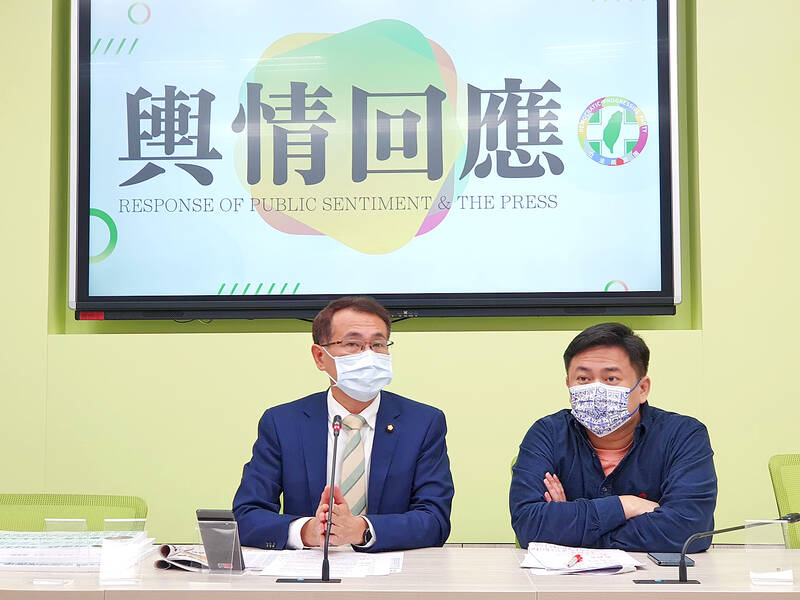Any Chinese “spy” balloon flying through Taiwan’s airspace should be taken down, Democratic Progressive Party caucus director Cheng Yun-peng (鄭運鵬) said yesterday.
A US fighter jet on Saturday shot down a suspected Chinese surveillance balloon using an AIM-9X Sidewinder missile after it was detected flying over the US on Thursday.
While China said the balloon ended up in the US’ airspace after being blown off course, the world believes that is unlikely, as China is capable of maneuvering balloon satellites, Cheng said.

Photo: Hsieh Chun-lin, Taipei Times
The balloon demonstrates China’s expansionist ambitions, he said.
Instead of using balloons, China has been openly carrying out actual threats against Taiwan that involve military aircraft, naval vessels and even missiles, Cheng said.
Some pro-unification advocates in Taiwan considered the incident an opportunity for Taiwan to show friendliness to China, which was “a terrible insult to Taiwan,” he said.
Their view also sent the wrong signal regarding Taiwan’s international status and sovereignty, and could undermine the international community’s respect for the nation, Cheng said.
China’s ambition to invade Taiwan is more serious than sending in a balloon, he said.
“If a Chinese spy balloon drifted into Taiwan’s territory, I would say it should be shot down,” Cheng said, adding that shooting down the device would not be an act of provocation, as “it should not be there in the first place.”
He called on all political parties to take a united stand on the matter to defend Taiwan’s sovereignty, dignity, democratic system, economic development and way of life.
Separately, Institute of National Defense and Security Research director Su Tzu-yun (蘇紫雲) and Defence International magazine director Chen Kuo-ming (陳國銘) on Sunday said that high-altitude surveillance balloons can detect and collect atmospheric data related to artillery.
The US waited until the balloon flew to the open sea before shooting it down to ensure the safety of the people on the ground, which is worth learning from, they said.
However, whether using missiles to shoot down a balloon is cost-effective requires further deliberation, they said.
The Ministry of National Defense said that a Chinese meteorological balloon passed over northern and central Taiwan shortly after the Lunar New Year holiday in February last year, adding that it did not shoot it down, but had at the time closely monitored it.
The military monitors all aerial devices, including balloons, around Taiwan and would react accordingly, it said.

CHANGING LANDSCAPE: Many of the part-time programs for educators were no longer needed, as many teachers obtain a graduate degree before joining the workforce, experts said Taiwanese universities this year canceled 86 programs, Ministry of Education data showed, with educators attributing the closures to the nation’s low birthrate as well as shifting trends. Fifty-three of the shuttered programs were part-time postgraduate degree programs, about 62 percent of the total, the most in the past five years, the data showed. National Taiwan Normal University (NTNU) discontinued the most part-time master’s programs, at 16: chemistry, life science, earth science, physics, fine arts, music, special education, health promotion and health education, educational psychology and counseling, education, design, Chinese as a second language, library and information sciences, mechatronics engineering, history, physical education

The High Prosecutors’ Office yesterday withdrew an appeal against the acquittal of a former bank manager 22 years after his death, marking Taiwan’s first instance of prosecutors rendering posthumous justice to a wrongfully convicted defendant. Chu Ching-en (諸慶恩) — formerly a manager at the Taipei branch of BNP Paribas — was in 1999 accused by Weng Mao-chung (翁茂鍾), then-president of Chia Her Industrial Co, of forging a request for a fixed deposit of US$10 million by I-Hwa Industrial Co, a subsidiary of Chia Her, which was used as collateral. Chu was ruled not guilty in the first trial, but was found guilty

DEADLOCK: As the commission is unable to forum a quorum to review license renewal applications, the channel operators are not at fault and can air past their license date The National Communications Commission (NCC) yesterday said that the Public Television Service (PTS) and 36 other television and radio broadcasters could continue airing, despite the commission’s inability to meet a quorum to review their license renewal applications. The licenses of PTS and the other channels are set to expire between this month and June. The National Communications Commission Organization Act (國家通訊傳播委員會組織法) stipulates that the commission must meet the mandated quorum of four to hold a valid meeting. The seven-member commission currently has only three commissioners. “We have informed the channel operators of the progress we have made in reviewing their license renewal applications, and

Taiwan-based publisher Li Yanhe (李延賀) has been sentenced to three years in prison, fined 50,000 yuan (US$6,890) in personal assets and deprived political rights for one year for “inciting secession” in China, China's Taiwan Affairs Office spokesman Chen Binhua (陳斌華) said today. The Shanghai First Intermediate People’s Court announced the verdict on Feb. 17, Chen said. The trial was conducted lawfully, and in an open and fair manner, he said, adding that the verdict has since come into legal effect. The defendant reportedly admitted guilt and would appeal within the statutory appeal period, he said, adding that the defendant and his family have